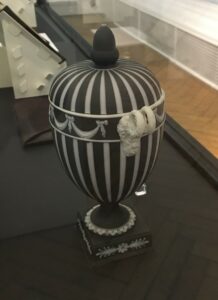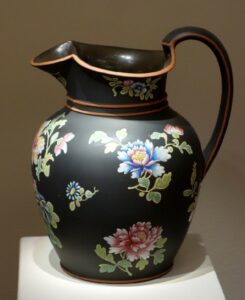Pair of Vases Black basalt with applied white decoration, Wedgwood, Etruria, c. 1894

One of a pair of Wedgwood black basalt vases gifted to Blackburn Museum and Art Gallery by James Dunn. Seen on display in the Holding the Vision exhibition.
2 June 2020
By Dr Cynthia Johnston, Institute of English Studies, School of Advanced Study, University of London
In addition to collecting books, James Dunn also collected ceramics and paintings. Dunn’s obituary states that:
Mr Dunn had three hobbies – travel, particularly on the Continent; the collection of rare and beautiful books, engravings and pottery; and tramping in England as well as France… In his search for treasures – his home itself was a library and art gallery – he would wander for hours round the old bookshops of the Continent, particularly of Paris.[1]

Jug, Wedgwood Factory, early 1800s, black basalt ware with polychrome enamel. Chazen Museum of Art, University of Wisconsin, USA.
The pair of black basalt Wedgwood vases that Dunn gave to the Blackburn Museum must have been part of a much larger collection of ceramics. These classically inspired urns, (each is topped with a removable lid) were made from one of the most successful of Josiah Wedgwood’s 18th century experiments in the manufacturing of ceramics. By adding manganese to the basalt process, Wedgwood was able to achieve a richer, deeper colour of black. By 1767, what Wedgwood described as his ‘Black Basaltes’, were being sold. According to the Wedgwood Museum, this black stoneware was used for a wide variety of products including vases, candlesticks, medallions and busts. The smooth black surface provided the ideal medium for the application of the finely drawn and modelled classically inspired decorations to many of Wedgwood’s products. Wedgwood referred to the method of decoration for these products as ‘encaustic’, which literally means ‘burnt-in’ but which implies that a decoration has been inlaid into a clay surface with clay of a contrasting colour. However, Wedgwood’s decorations, as in the case of Dunn’s vases, were not truly encaustic in a strict sense, Wedgwood’s decorative applications were painted onto the surface of the object using a coloured clay ‘slip’ (that is clay diluted with water). The example below from the Chazen Museum demonstrates the striking effect of contrasting colour applied to the black surface.
Wedgwood famously remarked that ‘Black is Sterling and will last forever’. He was correct; the Wedgwood company continued to manufacture black basalt pieces until the twentieth century, and it is still used in manufacture today by virtue of its strength and virtuosity in the reception of decorative techniques.
________________________________________
[1] Northern Daily Telegraph, 16th December, 1943.